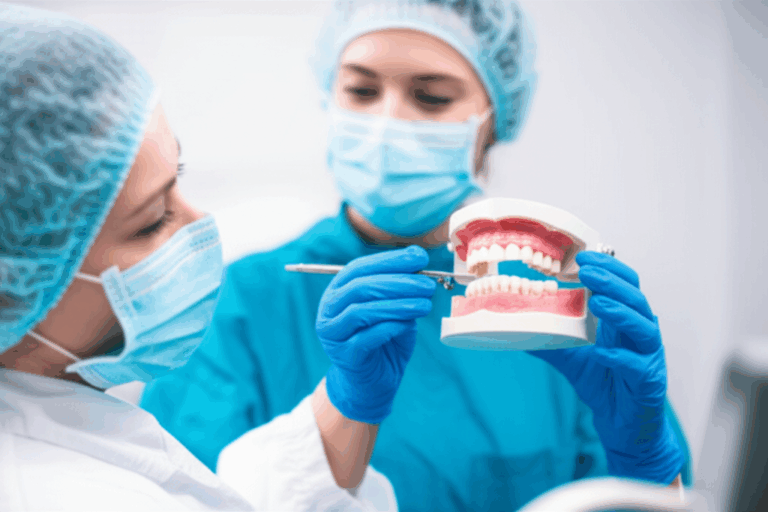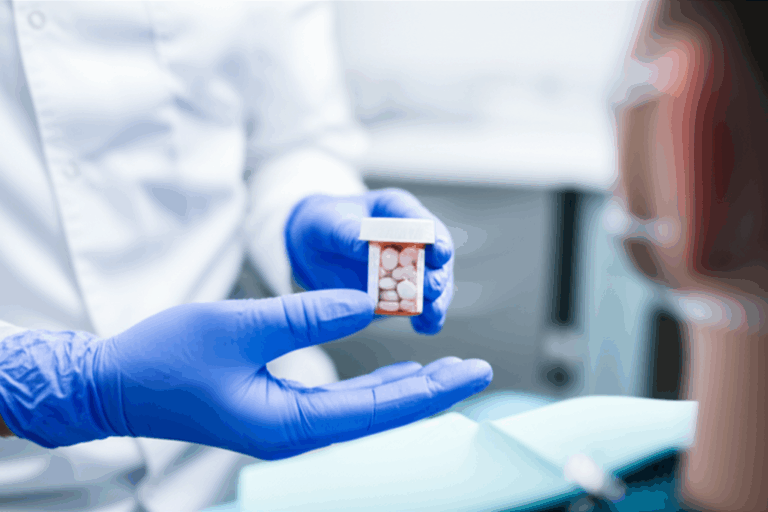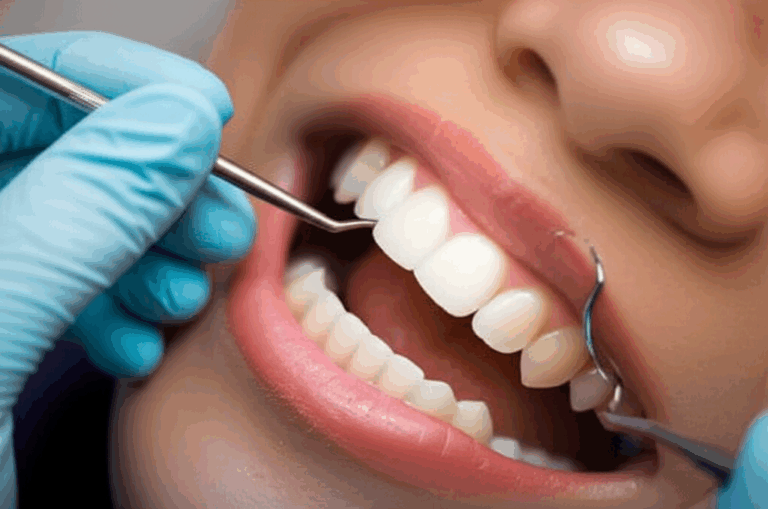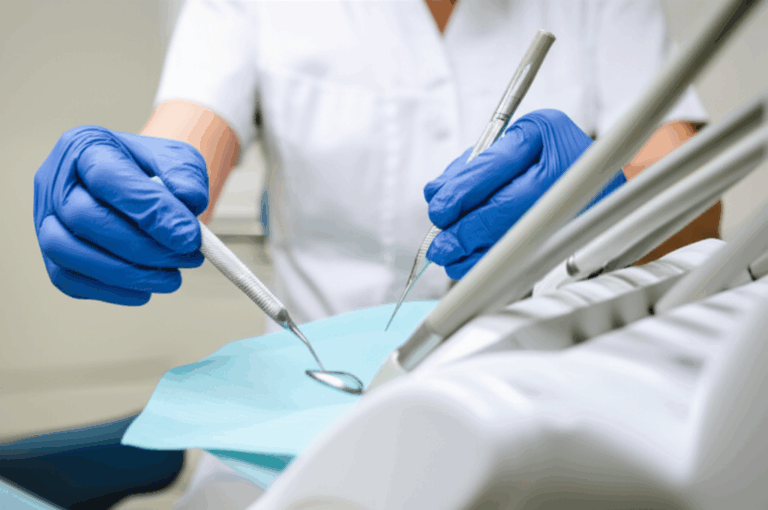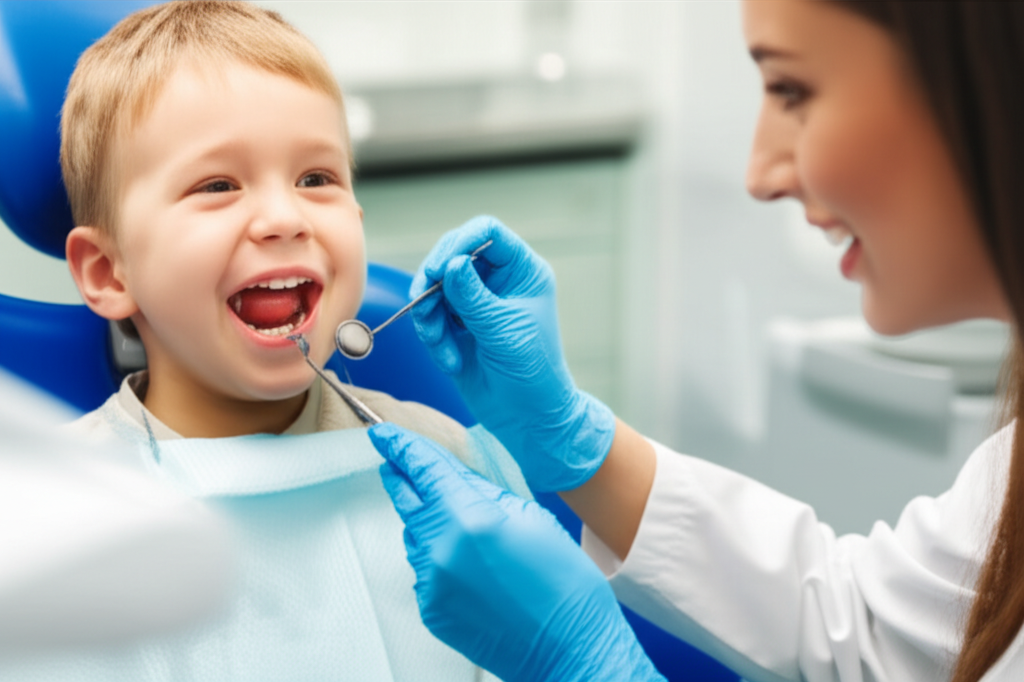
When Should Your Child First See a Dentist? The Definitive Guide for Parents
Summary:
If you’re a parent, you already know that your child’s first steps, first words, and first day of school are moments to remember. But here’s a milestone that often slips under the radar: their first dental visit. In this article, I’ll share why that first visit matters, what age is best, and how early dental care can change your child’s future smile for the better. Let’s set up healthy habits that can last a lifetime—one tooth at a time!
Table of Contents
Why Is Early Dental Care So Important?
Let’s be honest: baby teeth fall out, so why do they even matter? It’s a fair question. Many parents believe those tiny teeth aren’t important, but that’s not true. Baby teeth help kids chew, talk, and smile. They also save space for the grown-up teeth that come later.
Here’s the problem. Almost 1 in 4 kids under five already has at least one cavity (according to the Centers for Disease Control and Prevention). Cavities cause pain, make it hard to eat, and sometimes cause infections that can spread. Without early dental care, these small problems can become big ones.
But there’s good news! When kids see a pediatric dentist early, families can learn the best ways to care for teeth, catch problems quickly, and keep little mouths healthy. That’s why the first visit matters so much.
What Age Should a Child Go to the Dentist?
If you’re here for a straight answer, here it is: Your child should go to the dentist by their first birthday, or within six months after their first tooth comes in. This is true whether your child has one tooth poking through or a whole mouthful.
Both the American Academy of Pediatric Dentistry (AAPD) and the American Dental Association (ADA) say this is best. Early visits make what dentists call a dental home—a place where you and your child get steady, trusted care year after year.
Why this timeline? Cavities can start as soon as teeth show up! Waiting until age three (or until all baby teeth are in) often means you miss problems, you miss ways to stop trouble, and you pay more later on.
Why Do Dentists Recommend the First Visit So Early?
Let me paint a picture. Imagine you wait until your child has a lot of teeth before visiting the dentist. You might not notice early signs of decay, tongue or lip ties, or bad habits like bottle feeding at night. By then, an easy fix turns into a big repair, and nobody wants that.
Dentists call this early way making a dental home. It’s about more than just checking teeth. Your dentist will:
- Make sure teeth are coming in right
- Spot problems with jaw growth or speech
- Teach you how to brush and floss for your child
- Show you how to stop early childhood caries (ECC), sometimes called “baby bottle tooth decay”
- Talk about healthy habits and foods that protect teeth
Starting early helps your child get used to the dental office, builds trust, and makes visits a whole lot less scary.
What Happens at the First Dental Visit?
Now if you’re picturing your baby getting a filling or sitting in a big scary chair, relax! The first visit is much more like a “get to know you” session.
What to Expect
- Gentle look at the teeth, gums, and mouth (a quick mouth check)
- Counting teeth and checking for any signs of cavities or infection
- Advice about teething and how to care for teeth at home
- Light cleaning if needed, plus fluoride for cavity prevention
Many dentists use the “knee-to-knee” method—you hold your child on your lap, the dentist chats with both of you, and everyone stays close and comfy. Nothing forced, nothing scary.
The visit ends with a talk about your child’s risk for cavities. The dentist will answer all your questions—think of them as your helper for all things baby teeth.
How Can I Prepare My Child for Their First Dental Visit?
Even little ones can get nervous around new people—dentists included. One thing that helps is making the first visit something fun.
- Choose an appointment when your child is usually rested and happy.
- Talk about the visit as a fun adventure (“Today we’ll see the tooth doctor and count your teeth!”).
- Bring a favorite toy or blanket.
- Read picture books about going to the dentist.
Most importantly, stay calm and positive. Kids notice how parents feel. If you’re at ease, they’re much more likely to relax too.
What Else Does a Pediatric Dentist Do?
A pediatric dentist is a dentist with more training just for kids, babies, and teens. They know all about the little things, from the best way to brush a tiny tooth to helping with dental anxiety (which can be really tough for some kids).
Here are just a few things you can expect:
- Teaching parents to spot signs of tooth grinding or bad breath
- Giving advice about thumb sucking or using a pacifier
- Watching tooth eruption charts to make sure teeth are coming in on time
- Suggesting ways to stop cavities like sealants and fluoride
- Helping with accidents or falls that hurt teeth
Pediatric dentists also know how to make check-ups fun, using games, simple toys, and lots of praise.
How to Choose the Right Dentist for My Child?
Should I go to a pediatric dentist or is a general dentist okay?
That’s a question I hear all the time.
Pediatric dentists have 2-3 more years of school to handle problems that come up with kids—from tiny mouths to nervous little ones. Many have rooms with bright colors, small chairs, and even toys in the waiting room. If your child has special needs or is extra nervous, a pediatric dentist is usually your best pick.
But some general dentists are great with kids, especially if they work in family practices and see kids a lot. Ask your friends, read reviews, and call the office. Trust your gut! What matters most is that you and your child feel welcome and listened to.
Looking to explore more about dental innovations for all ages? Visit our china dental lab for the newest trends in dental care.
What If My Child Is Older Than One and Hasn’t Been to the Dentist?
Feeling a little late to the party? Don’t worry. It’s never too late to start.
Maybe you missed the first birthday window or your child’s first tooth came in before you knew it—it happens! The important thing is to set up that first dental visit soon. Seeing the dentist early is best, but “better late than never” is really true here.
At your appointment, tell your dentist this is your first time. They’ll show you what to do next, how to handle any problems now, and how to avoid issues later.
Common Questions About Early Dental Care
What if my child has no teeth by their first birthday?
Go ahead and make an appointment. The dentist will check your child’s mouth and answer questions about teething and gum care.
Is dental insurance likely to cover baby dental visits?
Most plans pay for check-ups for children. If you have Medicaid or CHIP, they usually cover it. Call your plan for details.
What are signs of dental problems in toddlers?
Look for white or brown spots on teeth, swollen gums, pain while eating, stinky breath, or bleeding during brushing.
My child is afraid of the dentist. What can I do?
Read books, talk about the dentist in a happy way, and ask your dental office about ways to help nervous kids or arrange a “get to know you” visit before the appointment.
What if my child has a dental emergency?
Broken teeth and accidents happen (especially with active kids!). Call your dentist or a local emergency dentist right away.
If you need strong and comfy solutions, learn more about your choices through our removable denture lab.
Quick Tips for Healthy Kids’ Smiles
- Brush with a tiny dot of fluoride toothpaste from the first tooth
- Wipe baby gums with a clean cloth after feedings, even before teeth show up
- Try not to give a bottle or breastfeed right before sleep unless you clean your child’s teeth afterward
- Keep sugary snacks and drinks low—go for healthy snacks like cheese, veggies, fruit
- Keep up regular dental check-ups every 6 months
And remember, for custom ways to fix teeth as your child grows, look at the options from our crown and bridge lab.
Summary Table: Early Dental Visit Facts
| Fact | Why It Matters |
|---|---|
| First dental visit by age 1 or within 6 months of first tooth | Stops cavities, helps teeth grow right, starts good habits |
| Early Childhood Caries (ECC) affects 1 in 4 kids under 5 | Early visits mean early stopping and quick fixes |
| Making a ‘dental home’ means lower dental bills later | Kids with early dental homes need less pricey care over time |
| Fluoride and sealants can stop most cavities | Ask your dentist about these simple ways to stop cavities |
| Lots of kids are scared of the dentist, but fun visits help | Builds trust and confidence, so future visits are easy |
| Pain, infection, and missing school days can happen with untreated cavities | Early dental care helps your child stay happy and healthy |
Final Thoughts: A Lifetime of Smiles Starts Now
Taking your child to the dentist early might seem like a small thing. But it’s the first step in a lifelong path to healthy teeth, bright smiles, and pain-free days. Kids who learn to care for their mouths young keep those habits as they grow up—and aren’t usually scared of the dentist later.
So don’t wait for a problem to show up. Start early, be on the lookout, and pick a dental team you feel good about. Your future self (and your child) will thank you.
Key Takeaways:
- Set up the first dental visit by your child’s first birthday or within six months of the first tooth
- Early visits find problems, teach healthy habits, and keep cavities away
- Pediatric dentists know all about kids’ teeth, but family dentists can be good too
- It’s never too late to start—call for that first visit today
- Brushing, watching sugar, and making visits happy are big helps
Give your child a reason to smile every day. Start with simple dental care from the very beginning!

